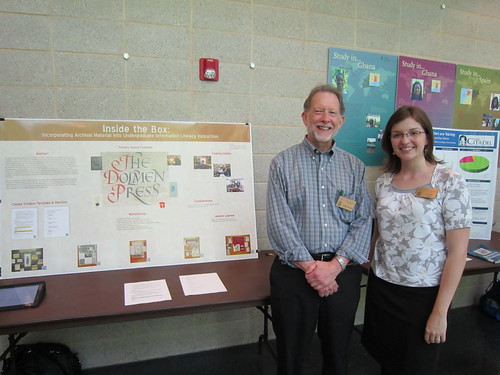This article is more than 5 years old.
By Craig and Audra
On Tuesday, March 10, Audra and I journeyed to Chapel Hill to present our poster at the Librarians’ Association of UNC-CH Research Forum held in the Sonja Haynes Stone Center. The forum is a combination of poster sessions and paper presentations: there were 10 posters and 3 papers presented. Poster Sessions were held outside the assembly room where papers were presented which allowed visitors to view and talk about posters with each presenter. Audra and I got lots of great comments and met a number of people interested in using archival material for information literacy. Our poster, entitled: Inside the Box: Incorporating Archival Material into Undergraduate Information Literacy Instruction described our LIB100 class last fall where we used materials from the Dolmen Press Collection for group research and exhibit projects.
Interestingly, it seemed like the subtext of the Research Forum was library instruction and information literacy because most of the presenters dealt with the is subject in some way.
After our first hour of presenting our poster, we had an hour of paper presentations with the anchor leg of the presentation delivered expertly by Roz Tedford!
The first paper was given by Genya O’Gara from the NC State University Special Collections Research Center regarding the Student Leadership Initiative, a project to document student leadership in NCSU history through oral interviews and videos. Through a partnership with the Public History program at NCSU, their department was able to train students using the workshop method to create a cohort of students. This cohort could then connect to NCSU history through oral history interviews with past student leaders. Genya found that alums preferred to speak to current student students instead of librarians. Some of the benefits of the program have been new oral histories, collaboration with other departments, new collections donated by interviewed alumni, enhancing the University Archives’ web portal, creation of physical and digital exhibits, and new programs and events.
The second paper was presented by Lynda Kellam and Jenny Dale from UNCG and was entitled: “Living and Learning with the Library: Outreach to Campus Learning Communities.” At UNCG, they are attempting to give every freshman the opportunity to participate in a “learning community.” A learning community is described as a group who lives and learns together- so many (like the Warren Ashby Residential College) focus on certain issues-like social justice. Lynda and Ginny have been given the assignment of implementing this program by actually being ‘in residence’ at each learning community for several hours each week. This is really being ’embedded.’ This is a great concept to bring a librarian directly to the students and make them available in a significant way.
The final paper of the day, presented by ZSR’s Roz Tedford was entitled: “How to Build it, so They Will Come: Designing and Implementing a Successful For-Credit Information Literacy Program.” Roz described Wake Forest and ZSR as well as the foundations of LIB100 as a team taught course initially. She went on to say that the first LIB100 efforts were quickly revamped into individually taught courses, which give each instructor the freedom to teach the course as they see fit. This freedom is part of the success of LIB100at ZSR. Roz said LIB100 at ZSR is so very successful because it is marketed by our students. When students tell other students a course is great, Roz says, “you’re done” and marketing really isn’t necessary. I was proud to sit there and listen to one of ZSR’s leaders tell of our success in information literacy. When the question session started, it was apparent that Roz had interested the crowd because most of the questions were directed to her.
Following the papers, Audra and I spent another hour talking to people about our project and visiting the other posters. All in all, this was a great day of swapping stories, sharing our experience in information literacy and knowing that our efforts are appreciated not only at ZSR, but in the library world at large.


3 Comments on ‘LAUNCH-CH Research Forum’
thanks for this informative report! Giz and I attended last year and I thought it was a good event. Glad to hear it still was this year. P.S. Your poster looks wonderful.
Interesting post. I’m glad that ZSR was so well represented!
Great post! And great poster! 🙂